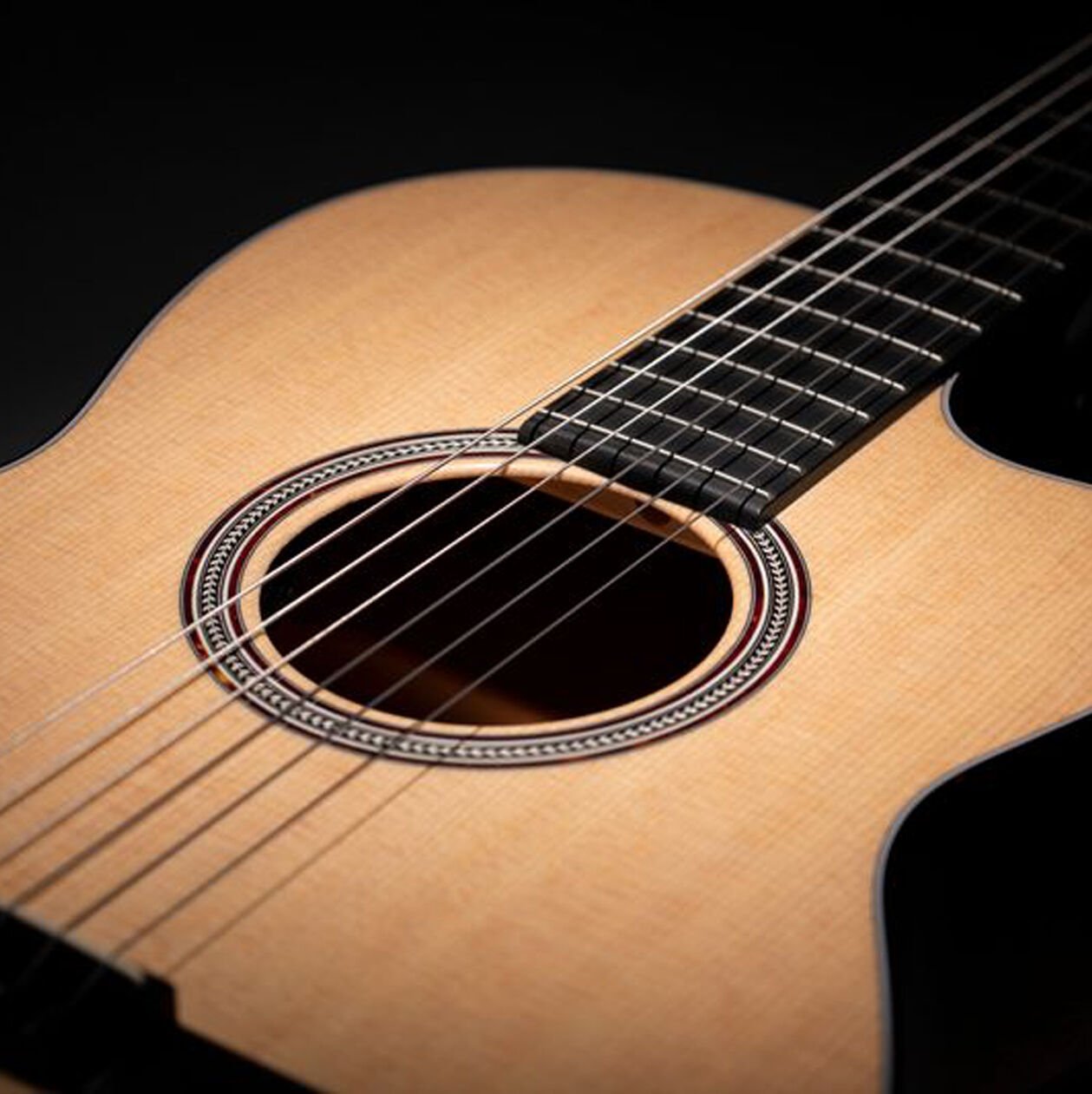From the Factory | March 20, 2024
Nylon vs. Steel String Acoustic Guitars: What’s the Difference?

There’s a lot to consider when it comes to guitars – acoustic or acoustic-electric? Extra light or medium gauge strings? LX1 or D-45? But one of the fundamental decisions a player must make is whether to opt for nylon or steel strings.
Whether you’re a beginner looking for your first acoustic or a seasoned pro who wants to change things up, choosing one over the other significantly influences the sound, feel, and overall experience of playing the guitar.
Understanding the nuances between these two types of guitars is essential for any player. Consider this blog post as your comprehensive guide to answering all your nylon vs. steel strings-related questions. Let’s dive in.

What is the Difference Between Steel and Nylon String Guitars?
The primary difference between steel and nylon string guitars lies in their construction and intended use. Steel string guitars, commonly found in acoustic and electric variations, are designed to produce a bright, crisp sound that resonates across musical genres. On the other hand, nylon string guitars, popular in classical and flamenco music, offer a softer, more mellow tone, providing a rich and intimate sonic experience. Several factors set these guitars apart:
Construction: Steel string guitars typically feature a larger body and a neck designed to withstand the higher tension of steel strings, while nylon string guitars often have a smaller, lightweight build to accommodate the lower tension of nylon strings.
Nylon string guitars also have a wider neck, which creates more space between the strings and more room to move around the fingerboard. The scale length on nylon string guitars is longer as well, impacting things like tension and string feel, tone, and fret spacing – nylon string guitars have more space between the frets.
Tuning Stability: Steel strings tend to hold their tuning better over time compared to nylon strings, which may require more frequent adjustments, particularly in response to environmental changes. Nylon strings are also tied to the guitar’s bridge, while steel string guitars use bridge pins to hold the strings in place.
Sound Quality: While steel strings offer a brighter and more articulate sound, nylon strings produce warmer, more rounded tones with a subtle resonance that lends itself well to classical and fingerstyle playing – most classical guitarists play without a pick.
Musical Style: The choice between steel and nylon string guitars often aligns with specific musical genres and playing techniques. Steel string guitars are versatile and suitable for a wide range of styles, including folk, rock, blues, and pop. In contrast, nylon string guitars are favored in classical, flamenco, and traditional folk music due to their distinctive tonal characteristics and responsiveness.
Comfort & Feel: The feel of a guitar's strings can significantly impact a player's comfort and enjoyment. Nylon strings are softer on the fingers and require less pressure to fret, making them ideal for beginners or those with sensitive fingertips. Steel strings may cause discomfort or calluses during prolonged playing sessions, especially for new players.

Pros and Cons of Nylon Strings
Nylon string guitars offer several advantages, including:
Softer on the Fingers: Nylon strings are gentler on the fingertips, making them more comfortable for extended playing sessions, especially for beginners.
Warm, Mellow Sound: Nylon strings produce a gentle, mellow tone that is well-suited to classical and fingerstyle playing.
Compact & Portable: Nylon string guitars are often smaller and lighter than their steel string counterparts, making them easier to transport and handle.
However, nylon string guitars also have some drawbacks:
Lower Volume: Nylon strings are typically quieter than steel strings, which may be a disadvantage in certain performance settings.
Tuning Instability: Nylon strings can be more prone to going out of tune, particularly in response to changes in temperature and humidity.
Vulnerability to Heat: Exposure to high temperatures can cause nylon strings to loosen or even warp, requiring adjustments or replacement.
Pros and Cons of Steel Strings
Steel string guitars offer numerous benefits, including:
Versatility: Steel strings are suitable for a wide range of musical styles, from folk and country to rock and blues, providing a versatile platform for expression.
Loud, Crisp Sound: Steel strings produce a bright, articulate tone with excellent projection and clarity, ideal for lead lines and rhythm playing.
Tuning Stability: Steel strings are more resistant to changes in tuning, allowing for longer periods between adjustments.
However, steel string guitars also come with certain drawbacks:
Higher Finger Pressure: Steel strings require more finger pressure to fret notes accurately, which can be challenging for beginners or players with weaker hands.
Size & Weight: Steel string guitars often have larger bodies and necks compared to nylon string guitars, which may be less comfortable for some players, especially those with smaller hands or frames.

Are Strings Interchangeable?
It's important to note that nylon and steel strings are not interchangeable due to differences in tension, construction, and the instruments' design. Attempting to use nylon strings on a steel string guitar, or vice versa, can result in poor sound quality, compromised playability, and potential damage to your instrument.
Should I Choose a Nylon or Steel String Guitar?
The decision between nylon and steel string guitars ultimately boils down to personal preference, playing style, and musical goals. While nylon strings may offer a softer, more forgiving playing experience for beginners, steel strings provide versatility and a brighter, more dynamic sound that appeals to many players across different genres.
It's essential to consider factors like comfort, sound preference, and the type of music you intend to play when selecting a guitar. Regardless of your choice, both nylon and steel string guitars offer unique characteristics and opportunities for artistic expression.

Whether you're drawn to the warm, intimate tones of a nylon string guitar or the bright, resonant sound of a steel string instrument, Martin Guitar offers a diverse selection to suit every player's needs.
Explore Martin's iconic lineup of steel string guitars and check out our nylon string option – the 000C12-16E – to find the perfect match for your playing style and musical aspirations. We also offer a wide selection of strings, including our Classical Nylon Guitar Strings and Classical Magnifico® Premium Guitar Strings.
With high-quality craftsmanship and exceptional tone, Martin guitars and strings are trusted by musicians worldwide to deliver unparalleled performance and inspiration. Locate an authorized dealer near you and experience the craftsmanship and heritage that define Martin's legendary instruments.
Discover the beauty and versatility of both nylon and steel string guitars and embark on your musical journey with confidence.
Happy playing!